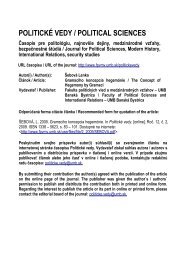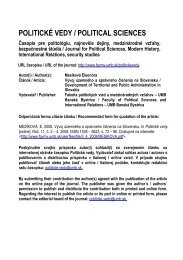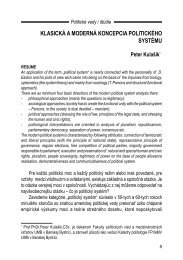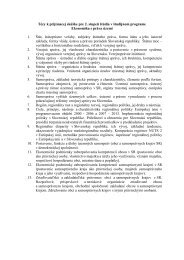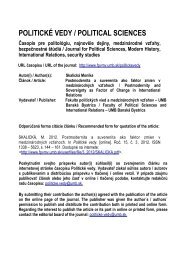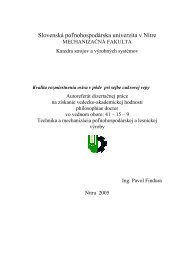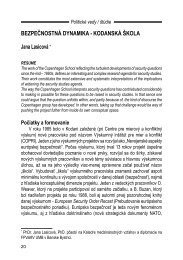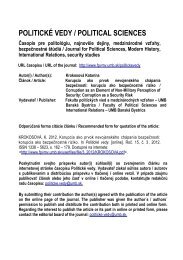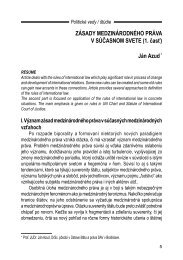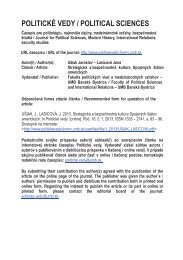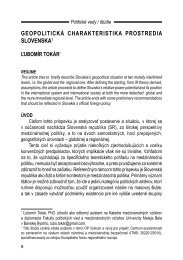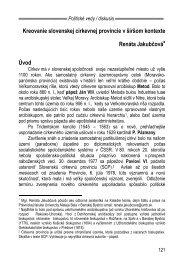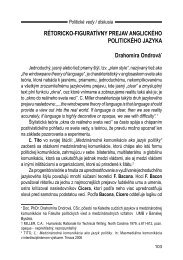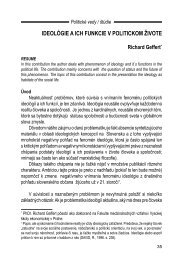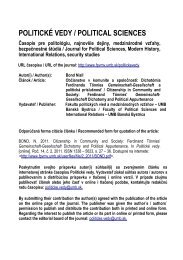MRAVNÃ VÃCHOVA V Å KOLÃCH NA SLOVENSKU A V ZAHRANI ÄÃ
MRAVNÃ VÃCHOVA V Å KOLÃCH NA SLOVENSKU A V ZAHRANI ÄÃ
MRAVNÃ VÃCHOVA V Å KOLÃCH NA SLOVENSKU A V ZAHRANI ÄÃ
Create successful ePaper yourself
Turn your PDF publications into a flip-book with our unique Google optimized e-Paper software.
1.1. Aims and contents of ethical education project 1<br />
Within the concept of ethical education ethical and moral issues are only a partial component of<br />
education, like religion or economy. They have no basic and decisive role, as it is claimed by Lencz<br />
(1997, s. 476). 2 The core of the moral education concept should be the best experience from the<br />
existing moral development of mankind included in the heritage of historical development of ethical<br />
thinking in the world. Philosophy and ethics have within the ethical education concept only<br />
supplementary character to the psychology-based educational programme that is derived from a<br />
problematic division of social and moral practice (and above all of human behaviour) into egoistic and<br />
pro-social. The whole concept is about “...whether we retreat within ourselves and our egoism or open<br />
our hearts and doors to others. In other words: whether we adopt the pro-social attitude or stay egoists”<br />
(Lencz et al., 1994, s. 15).<br />
Ján Grác draws attention, on the basis of empiric research, to the danger that follows uncritical<br />
emphasis of pro-sociality, as pro-social behaviour and acting do not necessarily mean moral behaviour<br />
and on the contrary antisocial acting is not necessarily immoral. One of the examples he uses is<br />
cheating at school (Grác, 2006, s. 58 – 59; 2008, s. 221). He reached serious conclusions concerning<br />
pro-social education performed in Slovakia in form of ethical education. The outcomes of the survey<br />
of the secondary school students in Slovakia notify missing (or deficient) development of ethical<br />
thinking, or reasoning within our educational system. In my opinion, the fact that senior students<br />
found moral reasoning and thinking in complicated and contradictory contexts of everyday life<br />
difficult is an important finding of this research. According to Grác, ethical (in my opinion, more<br />
likely moral) thinking can only be formed on the basis of certain knowledge, in this case knowledge of<br />
moral standards. Relating also to other authors he points out that even teachers of ethical education,<br />
not only pupils and students, find cognitive processing of moral values difficult. Communication<br />
without being aware of the importance of values and standards is one-sidedly preferred (Grác, 2005, s.<br />
244 – 256; 2006, s. 66 – 67; 2008, s. 246 – 248). Similarly, Jonathan Baron claims that majority of<br />
what is called immoral behaviour is the result of thoughtlessness, decline in thinking about<br />
consequences and relevant moral principles or non-reflexive engagement in relation to problematic<br />
ideologies. In reality it means absence of the ability of moral reasoning and thinking (Baron, 1990, s.<br />
77).<br />
In my opinion, at least two conclusions can be drawn of this: I am convinced that graduates of the<br />
five-year Master´s studies who are well-oriented in the issues of ethics and moral should be primarily<br />
preferred in teaching of ethical education. Especially teachers at secondary schools have to be wellprepared<br />
in the areas of applied ethics (bioethics, medical ethics, economic ethics, environmental<br />
ethics etc.) because that becomes the centre of attention in terms of contemporary ethics as the modern<br />
era brings more and more ethical and moral issues from all areas of life. Only the teachers who are<br />
well-educated in theory of all these areas can lead discussion and direct young people in this<br />
discussion, can help with formation of their moral attitudes. Knowing the contents of retraining<br />
courses organized by Methodological Centres, their graduates are not prepared for this task.<br />
Unfortunately, in many cases the same can be said about the university courses of ethics preparing<br />
future teachers of ethical education at various faculties in Slovakia. 3 That is why more attention should<br />
1 I dealt with the analysis of the ethical education contents in the past (Gluchman, 1996b, s. 415-424; 1999b, s.<br />
266-272), thus I will mention here only some of the most substantial comments.<br />
2 Like Miron Zelina, Ján Grác also observes that Olivar´s concept almost lacks the issue of a moral standard,<br />
which is the basis of all moral and thus also of moral education. According to Grác social standards, described<br />
by Roche Olivar, cannot be identified with moral standards (Grác, 2008, s. 246-247). On the basis of this, Grác<br />
comes to a very serious conclusion concerning the issue of ethical education. He claims that “so it happens that<br />
when we promote pro-social behaviour, we do not always promote moral behaviour” (Grác, 2006, s. 67).<br />
3 This statement can be supported by the study programme of ethics – English language at the Faculty of Science<br />
at University of Žilina. Out of 60 subjects attended during the 1. year of the studies 10 subjects were on Ethics, 4<br />
subjects on Philosophy and 26 subjects on English. It means that Ethics constituted only 16.7% of the overall<br />
studies contents and together with Philosophy it was 23.3% in comparison of 43.3% of subjects on English<br />
language and literature.<br />
284



